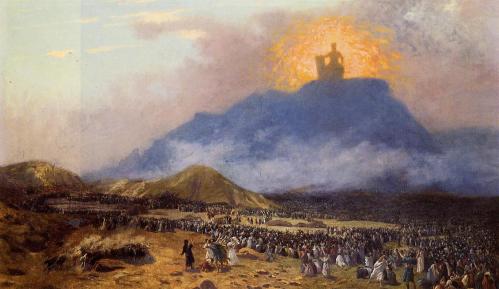
In Exodus 24:1-10, God has just given the most important guidelines for human behavior ever given to man. After Moses receives the ten commandments and the promises of God, he immediately begins working to share them. Good leader Moses told the people what God expected of them. Good leader Moses wrote it all down. Good leader Moses got up early and worshipped. Good leader Moses read the words aloud to the people. Then, he covered them with the blood of the sacrifices.
Notice that Moses did not cut the people up into pieces, burn them on the altar and sacrifice them in order to please God. No. He covered them with the blood of another as they came to the place of worship. Likewise, when we go to a place of worship, we should not be beaten, killed, and left to bleed on the altar for our sin by the leaders. A sacrifice was already made for us for that very reason. The blood of Jesus Christ should be applied to us by the servants leading worship.
After God reveals himself to the leaders, he calls Moses back up the mountain. Then, he tells him to do something very difficult: wait.
The Lord said to Moses, “Come up to me on the mountain and wait there, that I may give you the tablets of stone, with the law and the commandment, which I have written for their instruction.” ~Exodus 24:12
Wait, Moses. Go where I tell you and wait there. The reason for the waiting given to Moses was, “that I may give you the tablets of stone…” Moses was to wait so God could physically give him the tablets with the commands written on them.
Moses obeyed. He took his young friend Joshua and he went where God sent him. He put two others in charge over the people while he was gone. He is told to wait, and he in turn tells those under him to wait as well.
Note, good leaders do not leave those they have been given responsibility and charge over without delegating that responsibility and leadership to someone else first. He who is not faithful with what he has been given will not be given more. What he does have will be taken away. (Matthew 25:29)
Moses goes up and a cloud covers the mountain. God’s presence descended and for six days Moses waited upon God. It was not until day seven that Moses heard God call out to him.
Note, even when we obey God’s commands and instructions perfectly and without delay, he often still calls us to wait upon him for further instructions.
When God does appear, the text says, “Now the appearance of the glory of the Lord was like a devouring fire on the top of the mountain in the sight of the people of Israel.” When God appeared after all Moses’s waiting and righteous obedience, it was not just him that saw God. All the people below saw God appear. Moses wasn’t making this stuff up and they knew it. There could be no mistake. God was doing something of unmitigated importance. They all saw and they all knew. Makes you wonder how they could ever choose to make and worship and idol while this was still going on. But, as we all know they did just that with the golden calf.
Anyway, Moses is no stranger to the fire of God. When he was called to deliver God’s people out of Egypt, it was a burning bush that God chose to reveal himself and speak through. Make no mistake, Our God is a consuming fire and he will not be sold out as a dry and lifeless ember as some would seek to have him be. Little wonder the Bible says, “Quench not the Spirit.” (1 Thessalonians 5:19)
God kept Moses forty days and forty nights as he elaborated upon all the laws and also gave Moses the physical tablets of stone with the law written down on them by His very own finger.
Note, when God is giving instruction to leaders that he has placed over his people, he often does so for a great amount of time that they may be duly prepared for the difficult business he is about to employ them in.
Just to recap, here is what Exodus 24:12-18 gives us practically to apply in our lives today:
1. Moses did not cut the people up into pieces, burn them on the altar and sacrifice them in order to please God. No. He covered them with the blood of another as they came to the place of worship. Likewise, when we go to a place of worship, we should not be beaten, killed, and left to bleed on the altar for our sin by the leaders. A sacrifice was already made for us for that very reason. The blood of Jesus Christ should be applied to us by the servants leading worship.
2. Good leaders do not leave those they have been given responsibility and charge over without delegating that responsibility and leadership to someone else first. He who is not faithful with what he has been given will not be given more. What he does have will be taken away. (Matthew 25:29)
3. Even when we obey God’s commands and instructions perfectly and without delay, he often still calls us to wait upon him for further instructions.
4. Make no mistake, Our God is a consuming fire and he will not be sold out as a dry and lifeless ember as some would seek to have him be.
5. When God is giving instruction to leaders that he has placed over his people, he often does so for a great amount of time that they may be duly prepared for the difficult business he is about to employ them in.
